10 Signs Your Water Heater Needs Replacement
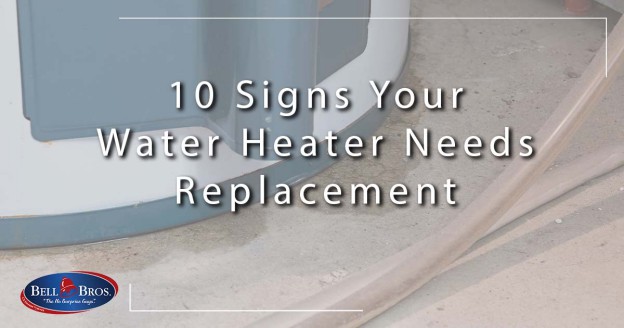
A reliable and efficient water heater is an essential appliance in your household. You need hot water daily for everything from showering to doing the dishes to the laundry. But like other appliances, water heaters have a finite lifespan and show signs of wear and tear over time.
If your water heater is nearing the end of its life or on its last legs, you may start to see signs of an impending breakdown. Here are the 10 most common signs that your water heater needs replacement from the experts in water heater replacement and furnace repair at Bell Brothers.
1. Your Water Heater’s Lifespan
One of the most important factors in determining whether your water heater needs replacement is its age. Depending on the type and model, the average lifespan can vary. Typically, tank water heaters last between eight and 12 years. Tankless water heaters can last around 20 years with proper maintenance.
As your water heater nears the end of its expected lifespan, it’s more likely to experience issues that need repairs. You may start to see the signs once it’s over a decade old, so it’s best to pay attention to any warning signs and consider replacing it before you have a sudden breakdown.
2. Insufficient Hot Water
A sudden drop in the amount of hot water your water heater produces is a clear sign that something is amiss. If you’re frequently finding yourself running out of hot water in the shower or while doing the dishes, your water heater may be reaching its end.
Insufficient hot water supply can be caused by a range of issues, including sediment buildup, a malfunctioning thermostat, or a failing heating element. These problems often become more severe as the water heater ages, which is a clear sign that it should be replaced.
3. Rusty Water
If you notice rusty or discolored water coming out of your hot water taps, this is a warning sign that your water heater may have degradation on the inside. Over time, the inner tank of a water heater can corrode, leading to rust and sediment in the water.
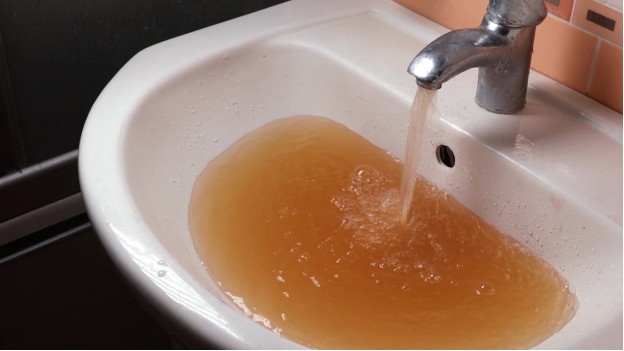
4. Strange Noises
Unusual noises coming from your water heater, such as rumbling, popping, or banging sounds, can be an indication that something is wrong. These noises are often caused by the buildup of sediment at the bottom of the tank. As the sediment accumulates, it can insulate the heating element, causing it to overheat and make strange sounds.
A buildup of sediment can not only decrease the efficiency of your water heater but can lead to its premature failure. If you hear strange sounds coming from your water heater, it’s a clear indication that it requires professional attention.
5. Leaks and Moisture Around the Water Heater
Water heaters are designed to contain water within their tanks, and any sign of water outside the tank is a cause for concern. Leaks and moisture around the base of the water heater can be indicative of a failing tank. As the tank corrodes over time, it becomes more susceptible to leaks, which can worsen rapidly.
If you notice any moisture or puddles around your water heater, it’s vital to contact professionals quickly. Often, the most effective solution is to replace the water heater before you experience significant water damage.
6. Inconsistent Water Temperature
Inconsistent water temperature is another sign that your water heater may be nearing the end of its use. if you have fluctuations in the water temperature all the time, especially if it goes from hot to cold quickly, it could be caused by a deteriorating heating element or a malfunctioning thermostat.
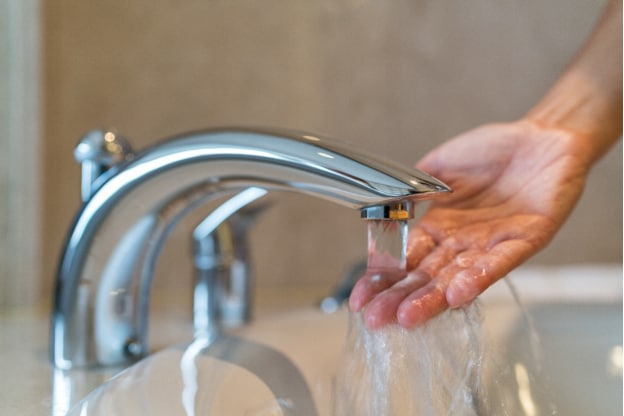
7. High Energy Bills
An aging water heater can become less efficient over time, leading to higher energy bills. If you notice a spike in your utility bills without a significant change in your hot water usage, it could be caused by your water heater.
As water heaters age, they may struggle to maintain the desired water temperature, causing them to run frequently and consume more energy. Replacing your old water heater with a newer, more energy-efficient model can translate to cost savings in the long run, so it’s often the more cost-effective option.
8. Pilot Light Issues
Gas water heaters have a pilot light. If it malfunctions, that could be a sign that your water heater should be replaced. If your pilot light frequently goes out or is difficult to relight, it could mean that there’s an issue with the thermocouple or other components.
A reliable pilot light is essential for the proper operation of your water heater. Persistent problems may mean that the unit is no longer reliable and should be replaced.
9. Visible Corrosion
Inspecting the exterior of your water heater for visible signs of corrosion is a straightforward way to assess its condition. If you notice rust or corrosion on the tank, pipes, or other exterior components, it’s a strong indication that the unit is deteriorating.
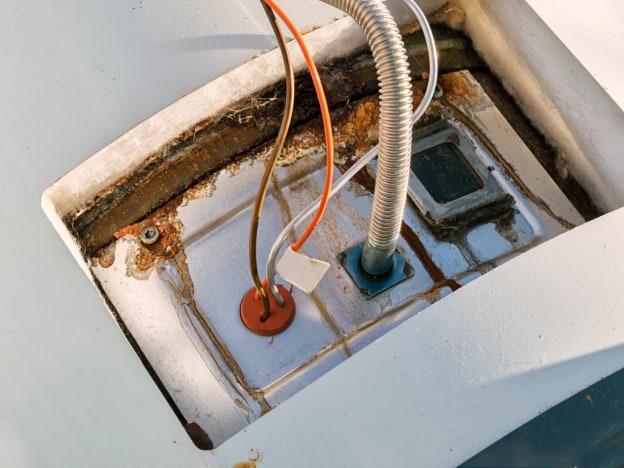
10. Repetitive Repairs
If you find yourself repeatedly calling for water heater repairs, it’s a clear sign that the unit may be reaching the end of its lifespan. Frequent breakdowns and repairs can be costly and inconvenient, and they often occur more as the water heater gets older.
When the cost of repairs begins to outweigh the benefits of keeping the existing water heater, it may be time to consider replacing it. A new water heater can provide better performance and reliability, saving you money over time.
When Is It Better to Repair Your Water Heater Instead of Replacing It?
Appliances are an investment for your home. Most homeowners try to fix their hot water heaters before they make the jump to replace them. A new hot water heater, including installation, can cost thousands of dollars.
Though it often makes more sense – and is often cheaper – to try repairs first, it’s not always possible or cost effective. Depending on the nature of the problem, you could get more out of springing for the upfront costs and replacing your water heater instead of putting money into repairs.
Here are some things to consider:
Your Water Heater’s Age
A gas- or electric-powered hot water heater can last eight to 12 years before it should be replaced, some longer. When it comes time to consider repairs or replacement, a water heater reaching the end of its average lifespan may be better to replace. If you hold onto it, you may end up putting a lot of money into repairs.
If your unit is less than five years old, a water heater repair may be the less expensive option than a total replacement. Your water heater may still be under warranty as well, but keep in mind that many manufacturers require regular maintenance inspections from a certified professional to uphold the warranty.
The Nature of the Repair
Not every water heater issue will cost an arm and a leg. Some are fairly inexpensive to solve. For example, problems with small components like pressure relief valves, thermostats, or broken heating elements may make more sense to repair instead of replacing the entire water heater.
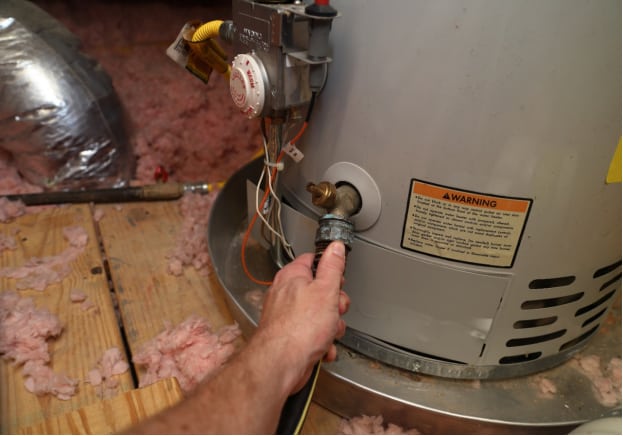
How Long You Plan to Stay in Your Home
If a repair can help the hot water heater function a few more years and you’re planning to move, a repair may be the better option. If you’re planning on staying in your home long term, however, consider the costs of a short-term repairs versus replacing the unit.
That said, if your unit is nearing the 10-year mark and you know you will need to replace it, getting a new water heater could be the least expensive option. You also have the reliability of knowing that you have a water heater in good working order.
If You’re Planning to Upgrade
If you’re planning to change the type of water heater you have in the near future, such as switching from a conventional water heater to a tankless water heater, make sure to factor this into your decision. If you’re waiting until the opportunity arises, there’s no sense in putting money into your current water heater.
Water Heater Replacement & Furnace Repair at Bell Bros
Water heaters can last a long time, but they’re not built to last forever. If you are experiencing problems with your water heater and repetitive repairs, consider if you should replace your water heater to get more reliability, efficiency, and peace of mind.
Is it time to replace your water heater? Contact the pros at Bell Brothers to schedule an appointment!

